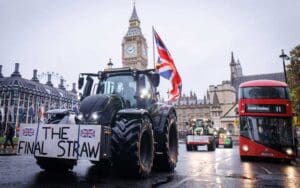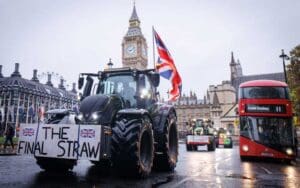Tractor Tax Could Affect Five Times More Farmers Than Government Claims, Expert Warns


Rachel Reeves’s proposed changes to agricultural relief on inheritance tax—dubbed the “tractor tax”—may impact five times more farmers than the government has estimated, according to the Central Association of Agricultural Valuers (CAAV).
The Treasury has stated that the changes will affect approximately 500 farmers each year. However, Jeremy Moody, secretary and adviser to the CAAV, argues that this figure is incorrect due to a misunderstanding of the farming industry’s complexities. He asserts that the new measures will actually impact around 2,500 farmers annually.
Moody contends that the Treasury’s analysis overlooks farmers who only claim Business Property Relief (BPR) and not Agricultural Property Relief (APR). This includes individuals who own land but not the farmhouse, those in farming partnerships, tenant farmers without ownership of land or buildings, and farmers who are shareholders in family companies.
“They’re wrong because they’re working on an incomplete picture,” Moody said. “What they got wrong is, they didn’t know what to ask and HMRC couldn’t answer them even if they had.”
He estimates that over a generation, about 75,000 farms will be affected by the changes.
Currently, farmers can claim up to 100% relief on inheritance tax for their land and buildings through APR and for operational equipment and livestock via BPR. Starting from April 2026, only the first £1 million of their combined land and business assets will qualify for 100% relief under the new rules. Any amount above this threshold will be subject to inheritance tax at an effective rate of 20%—half the standard rate of 40%.
The government argues that farmers can effectively have a nil-rate tax band of £1.5 million each, allowing a married couple to pass on up to £3 million in assets tax-free. This calculation includes personal inheritance tax allowances. However, Moody disputes this, stating that these thresholds are personal and should not be applied to business assets.
“That seems to me to be basically wrong,” he commented. “If you’re throwing all that against the farm then actually what you’re doing is saying all of your personal effects will be taxed at 40%.”
The BBC Verify fact-checking service has supported the Treasury’s estimates, and the government has publicized this analysis. Sir Keir Starmer remarked, “All of you can check out what that means in terms of the impact. I think the BBC has already done it.”
A government spokesperson stated: “Our commitment to our farmers is steadfast—we have committed £5 billion to the farming budget over two years, including more money than ever for sustainable food production… We have been clear since this change was announced that around 500 claims of Agricultural and Business Property Relief each year will be impacted… It is not possible to accurately infer inheritance tax liability from farm net worth figures as there are different circumstances affecting each farm.”
Moody criticises the government’s and BBC’s analyses for not fully understanding the farming industry, leading to underestimations of the policy’s impact. He emphasises that many farmers, such as tenant farmers, may not benefit from certain tax allowances and that the changes could significantly affect their financial standing.
Read more:
Tractor Tax Could Affect Five Times More Farmers Than Government Claims, Expert Warns







